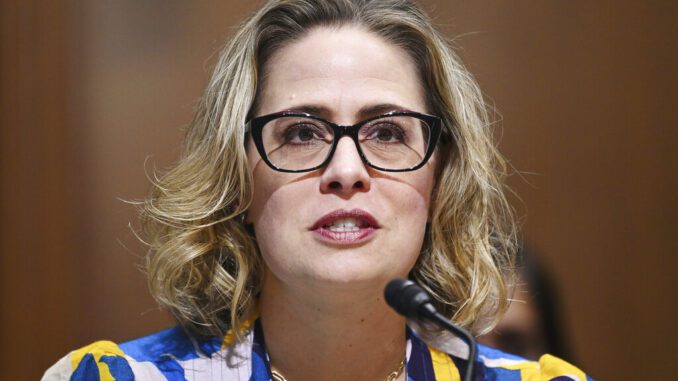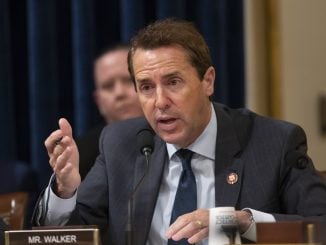
Politics is increasingly ripe for a new “third way.”
The percentage of Americans identifying as “independent” is on the upswing. As GOP political analyst David Winston has noted, 31% of Americans voting last month identified with neither party. They reject noisy, extreme and ineffectual voices in both parties. In Arizona, registered independents outnumber Democrats, and only slightly trail registered Republicans.
Public figures change political parties all the time, but their raison d’être was often to reject one party, not necessarily to embrace a new course. That has been true of the most recent notable national party splits, including Andrew Yang and Tulsi Gabbard.
Those two and now U.S. Sen. Kyrsten Sinema offer us three different trailblazing strategies. But Sinema’s, for now, is the most consequential. Sinema sits in a deeply divided U.S. Senate.
Sinema is now the third registered Independent in the U.S. Senate. The other two are Bernie Sanders (VT) and Angus King (ME). Both behave and reliably vote as Democrats and caucus with them. All three are on their state’s respective ballots in 2024.
Sinema’s switch won’t change the balance of power in the U.S. Senate. But if she wishes to retain or seek committee assignments, she must caucus with a party. If she caucuses with Democrats, nothing happens (she has indicated as much). If she chooses to caucus with Republicans, the Senate returns to an even 50-50 split, resulting in committees with even ratios. She could also choose to caucus with neither but lose committee memberships, and who knows where her desk would be located on the Senate floor.
Other outcomes are possible but hard to imagine, including both parties allowing her to sit as an independent member of certain committees. It would be new territory for the Senate, although party breaks and changes do occur. When the iconoclastic Wayne Morse (OR) broke with the GOP in 1953, he insisted on his Senate desk being located in the center of the chamber. Senate Democratic Majority Leader Lyndon Johnson eventually persuaded Morse to join his party. Morse lost reelection in 1968 and lost two subsequent attempts to return. He died in 1974.
Let the bidding wars begin. Don’t be surprised if another Senator or two joins her.
Newly reelected Nancy Murkowski (R-AK) has had issues with her party throughout her Senate career, and who knows what West Virginia’s Joe Manchin (D-WV) might do. Manchin has famously sided with Sinema to preserve the Senate’s filibuster, but his support for much of the Biden spending agenda has angered his increasingly Republican state. At age 73, most expect he’ll retire from office in 2024.
Sinema’s decision was no surprise given the hostile response she’s garnered from Arizona Democrats upset with her refusal to torpedo the Senate’s “filibuster,” which requires a 60-vote super majority to end debate and act on legislation. It isn’t the only policy or political issue she’s broken with Democrats.
Her state party censured her in 2021 after she voted to block a highly partisan and likely unconstitutional federalization of elections, a Democratic priority.
Sinema was guaranteed to face serious opposition for the Democratic nomination in 2024, likely from U.S. Rep. Ruben Gallego (D-AZ). She’s also likely repulsed by a dysfunctional pro-Trump state GOP that deserves blame for narrow electoral losses for the U.S. Senate (Blake Masters) and governor (Kari Lake).
Arizona also has a history of trailblazing if stubborn politicians, including the legendary Barry Goldwater (R-AZ) and, most recently, the late John McCain (R-AZ). Sinema is undoubtedly familiar with that heritage, but no one has successfully navigated an independent course to electoral success.
Kyrsten Sinema may be the first, especially with both major parties likely to nominate, again, candidates from their fringes. She enjoys support from the powerful business community.
There are lots to play out here. Sinema blazes a new trail in Arizona politics. She doesn’t necessarily have to belong to a committee, although that’s where much of the work is conducted on issues she cares about, including Arizona land and water.
Unless she chooses to retire from elective politics in 2024, Sinema becomes the first to signal whether this new path is lit with electoral success or a train headed in the other direction.
Kelly D. Johnston was the 28th Secretary of the U.S. Senate and a veteran of 35 U.S. Senate and House campaigns in 25 states, including North Carolina.


